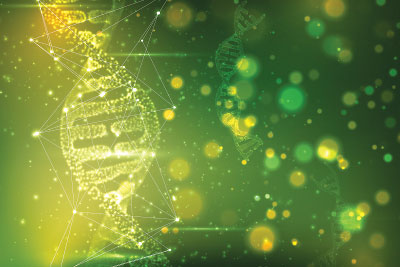Rare Neuropsychiatric Variants Present in 1% of Individuals
Abstract
Individuals with such rare genetic variants were found to be at increased risk of multiple psychiatric illnesses, though in many instances the adverse effects on cognition or behavior were subtle.

Though many neurodevelopmental and psychiatric disorders arise from a combination of genetic, environmental, and social factors, there are instances—for example, Down’s syndrome—where adverse genetic changes are the primary cause.
Such genetic changes—known as pathogenic variants—were believed to be quite rare in the general population. However, recent research from a team at Geisinger’s Autism and Developmental Medicine Institute in Lewisburg, Penn., suggests that about 1 in 89 people in their health system may have these changes, which are associated with an increased risk of autism spectrum disorder, schizophrenia, depression, and more.

As 1% is a conservative estimate for the prevalence of rare pathogenic variants, Christa L. Martin, Ph.D., thinks that more genetic screening of infants who might be at risk of a neurodevelopmental disorder is warranted.
“A lot of the work done with these rare genetic variants to date has involved cataloging based on a patient’s medical issues,” said senior investigator Christa L. Martin, Ph.D., the chief scientific officer at Geisenger, a large health care provider in central and northeast Pennsylvania. Such work begins when a patient comes to a clinic with unusual developmental symptoms and genetic tests are done to identify a potential cause of these symptoms, Martin explained. Over time, as researchers collect, curate, and share their findings, centers can develop genetic databases. Geisenger, for example, has created a library of over 1,500 variants that may be linked with neurodevelopmental and psychiatric disorders.
Geisenger also has an extensive genome repository, called MyCode, which includes over 180,000 patients from their health system. Martin and her team decided to analyze a subset of their repository to get a sense of how prevalent these pathogenic variants are in this broader adult population.
Martin and her team screened about 90,000 samples for two types of potentially harmful genetic variants: copy-number variants—in which a large segment of DNA is either lost or gained—and single-nucleotide variants—alterations to just a single unit of DNA but one drastic enough to cause a gene to be nonfunctional.
They identified copy-number variants in 708 participants (0.78%) and single-nucleotide variants in 312 participants (0.34%), resulting in a combined prevalence of 1.1%. Some of these findings were published in the January issue of The American Journal of Psychiatry.
“The next time you are in any decent-sized crowd, you can imagine that at least one person around you has one of these potentially severe variants,” Martin said.
She added that her team’s data are a very conservative estimate; they only included variants with enough evidence to be considered as “high confidence” for causing disease (31 copy-number variants and 94 single-nucleotide variants). There are hundreds of other known variants associated with neurodevelopmental problems and others yet to be identified.
“This is a baseline that will only grow,” she said.
Rare Variants Associated With Diverse Cognitive Effects
The researchers initially focused on diagnoses of 12 neurodevelopmental and psychiatric conditions, including attention-deficit/hyperactivity disorder (ADHD), autism spectrum disorder, bipolar disorder, intellectual disability, motor disorder, and schizophrenia. Overall, 34.3% of individuals with single-nucleotide variants and 30.1% with copy-number variants had at least 1 of these 12 diagnoses, compared with 14.6% of individuals without these variants. When the researchers also considered diagnoses of depression and anxiety, they found that the prevalence of a psychiatric disorder increased to 68.6% of adults with single-nucleotide variants and 66.4% of adults with copy-number variants.
The disorder most associated with these variants was intellectual disability, which was about eight times more likely to occur in someone with a single-nucleotide variant or a copy-number variant than those without.
The researchers also took a closer look at the health records from a subset of individuals with single-nucleotide variants. They found many instances where a patient was given no official neurodevelopmental or psychiatric diagnosis, but clinician notes suggested the patient was experiencing cognitive difficulties or other psychiatric symptoms.
Martin said that these findings highlight how broadly these rare pathogenic variants can manifest. “There’s a perception that these variants cause significant developmental problems, but they can also produce more subtle shifts in cognitive ability, or even not manifest until adulthood,” Martin said. “This one genetic change, though significant, does not define an individual.”
Martin hopes her group’s findings contribute to the discussion of when and for whom genetic testing should be conducted.
“Today there is agreement that genetic testing can be helpful once someone is diagnosed with a neurodevelopmental disorder like autism, but it could be prudent to start screening newborns in families with a history of such disorders,” Martin said. “Early intervention for conditions like autism or schizophrenia is critical, and there are measures parents can take to provide better care once they know there might be an increased risk in their child,” she said.
Martin said studies suggest that patients are receptive to receiving genetic testing. “We are in an era of knowledge seekers where people want as much information as possible about their health.”
These genetic studies were supported by grants from the National Institute of Mental Health. ■



